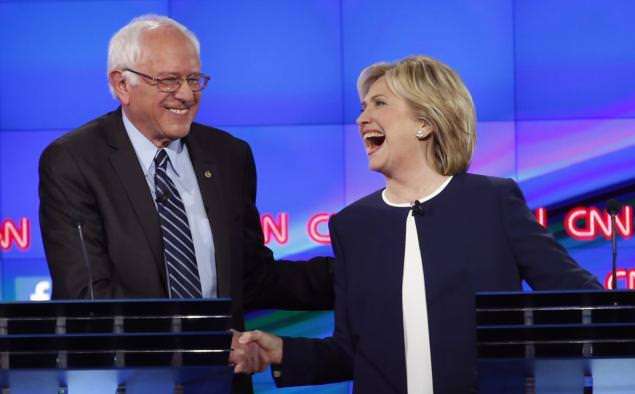Sanders and Clinton Vs. Capitalism
Neither seem to realize how much better life is, thanks to markets.


On Tuesday, Hillary Clinton and Bernie Sanders, along with other Democratic presidential candidates, were in Las Vegas, a city that does not believe in stifling commercialism, at the Wynn hotel, where suites go for as much as $900 per night. They came to deplore the evils of capitalism.
The senator from Vermont identifies himself as a "democratic socialist," and he's no pretender. In 1985, as mayor of Burlington, he traveled to Nicaragua to celebrate the sixth anniversary of what he called the "heroic revolution" of the Marxist Sandinistas.
CNN debate moderator Anderson Cooper asked, "You don't consider yourself a capitalist, though?" Sanders responded with grim vehemence: "Do I consider myself part of the casino capitalist process by which so few have so much and so many have so little, by which Wall Street's greed and recklessness wrecked this economy? No, I don't. I believe in a society where all people do well, not just a handful of billionaires."
Clinton gingerly distinguished her views from his. In thinking about capitalism, she said, "I think about all the small businesses that were started because we have the opportunity and the freedom in our country for people to do that and to make a good living for themselves and their families." But she said it is necessary to "save capitalism from itself."
From all this, you wouldn't know that capitalism has been the most productive economic model in history. The United States attained one of the highest living standards on earth through its reliance on private business, property rights and relatively unfettered markets.
"What ingrates they are," Hoover Institution economist David Henderson tells me. "They wouldn't be wearing those nice clothes, living in nice places or even having emails and computers to talk about if it weren't for capitalism."
Sanders and Clinton may take for granted the affordable travel, instant communications, appetizing food, advanced medical treatments and comfortable accommodations available to them—and most other Americans—on a routine basis. But these are largely the products of a profit-driven economic system.
Its achievements are too formidable to be denied. The capitalist class, one writer noted, "has been the first to show what man's activity can bring about. It has accomplished wonders far surpassing Egyptian pyramids, Roman aqueducts, and Gothic cathedrals; it has conducted expeditions that put in the shade all former Exoduses of nations and crusades." The author is someone Sanders may have read: Karl Marx.
Modern American capitalism is imperfect, as any system is imperfect. But to suggest it serves no function but to enrich "a handful of billionaires" or periodically crash the economy is misinformed or dishonest.
Consider the progress made by the planet's least fortunate inhabitants. The World Bank notes that between 2000 and now, despite the global financial crisis, "about 1 billion people rose out of extreme poverty. Most developing countries saw solid income growth for the bottom 40 percent of their income distributions." This change did not come about because the world grew more socialist.
What about here at home? Contrary to progressive myth, the middle class has not been ground into poverty in recent decades.
Last year, the Congressional Budget Office reported, "For households in the middle three quintiles of before-tax income, the cumulative growth in inflation-adjusted before-tax income between 1979 and 2011 was 29 percent." For the bottom fifth of the population, the increase was 59 percent. The fact that the top 1 percent did better yet doesn't nullify the progress.
In addition, consumers have access to many valuable things that didn't exist in 1979 (such as cellphones, HD televisions and the wonders of the Internet) or are better or cheaper than before (such as cars, air conditioning, power tools, groceries and clothing).
Clinton insists on limiting her praise to small companies that have not been successful enough to become large ones. But anyone eager to see workers prosper should beware of such romanticism. On average, employees of companies with 500 or more workers typically earn nearly double the wages paid to workers at those with fewer than 50 employees.
There is nothing inherently bad about big business. Amazon, Apple, Costco, Facebook, Starbucks and ESPN are huge enterprises that have flourished by catering to the desires of consumers—many of whom couldn't live without them.
The two Democrats should hope Americans don't consider which serves them worse—an economic system that falls short of egalitarian ideals or a political system that fills high offices with people like Sanders and Clinton.
© Copyright 2015 by Creators Syndicate Inc.


Show Comments (82)